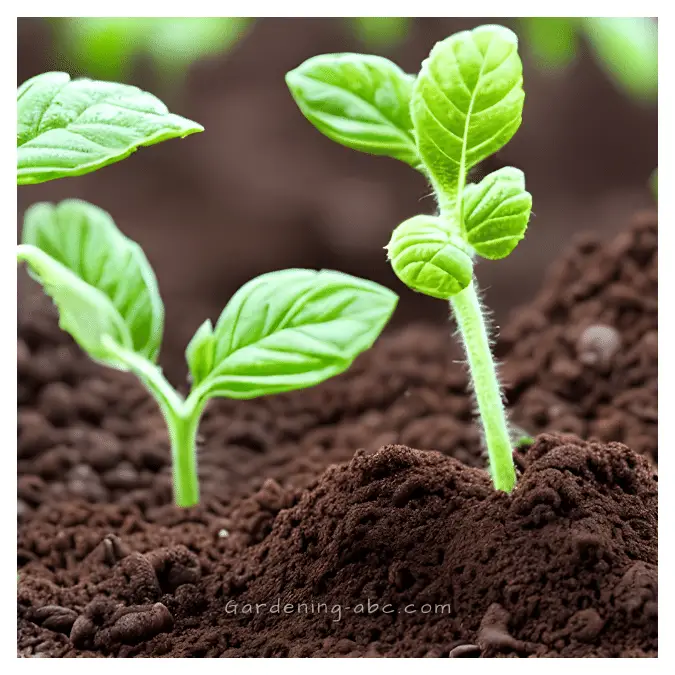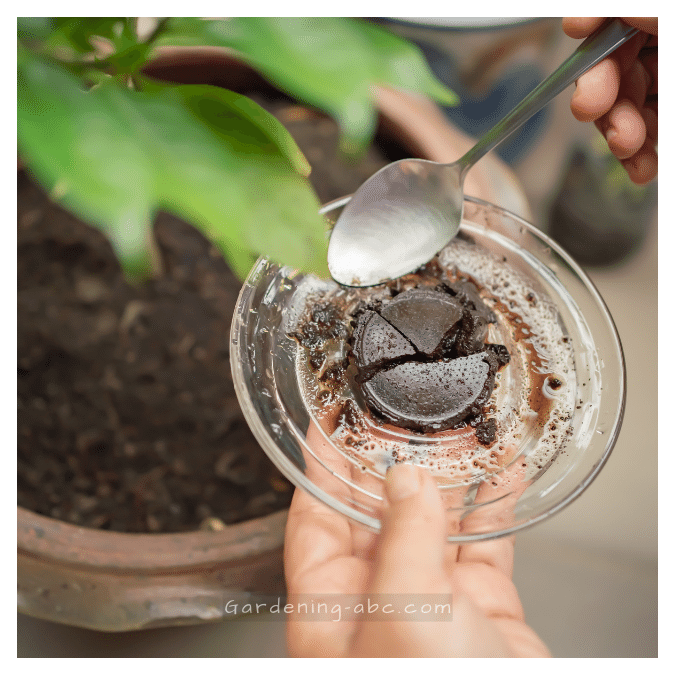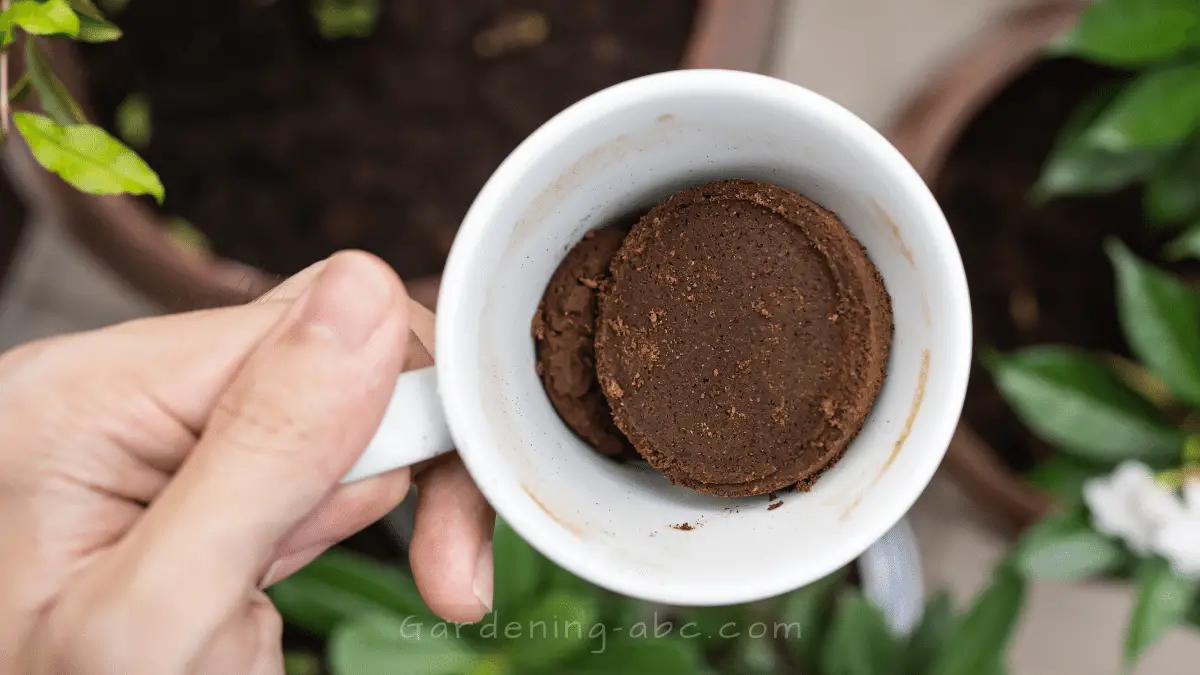We use affiliate links to run our site. When you buy through links on our site, we may earn an affiliate commission, without any added cost to you. Learn more
Coffee grounds have long been touted as a multi-purpose remedy for various gardening needs, from fertilizing to pest control. However, when it comes to their relationship with tomato plants, the claims surrounding coffee grounds may not hold up to scientific scrutiny.
In this article, we will try to understand the relationship between coffee grounds and tomato plants. So, let’s explore if there is any scientific evidence about whether coffee grounds are truly beneficial for tomato plants.
Claim 1: Coffee Grounds as a Fertilizer for Tomato Plants
One of the most common claims about coffee grounds is their ability to fertilize tomato plants.
People believe Coffee grounds, packed with nitrogen, phosphorus, and potassium, are like a nutrient-packed gift to the soil when they break down. It’s like a boost of energy for plants, making them grow like crazy!
While it is true that coffee grounds contain these essential nutrients, their effectiveness as a fertilizer for tomato plants is limited.
Scientifically speaking, coffee grounds have a relatively low nutrient concentration compared to traditional slow-release fertilizers designed specifically for plant growth.
The nitrogen in coffee grounds is very less around 2%. It’s cute, but it’s not gonna make a big difference like other organic fertilizers out there.

Claim 2: Coffee Grounds as a Soil Amendment
While coffee grounds may not function as a primary fertilizer for tomato plants, they can still contribute to overall soil health.
Coffee grounds can improve soil structure, water retention, and microbial activity when used as a soil amendment.
Their organic matter content can enhance soil drainage and aeration, preventing compaction and promoting a healthier soil ecosystem.
However, it is crucial to avoid using coffee grounds as mulch directly around tomato plants. Applying a thick layer of coffee grounds as mulch can create a compacted barrier, preventing moisture and air from reaching the soil.
This can ultimately suffocate the roots and hinder plant growth. Instead, it is recommended to mix coffee grounds with other organic mulch materials or apply them lightly before adding a thicker layer of mulch to avoid these negative side effects.
Claim 3: The Acidification of Soil

Another claim associated with coffee grounds and tomato plants is their ability to acidify the soil. While tomatoes generally prefer slightly acidic soil, coffee grounds are not a reliable method for achieving this.
The pH of coffee grounds varies, with some studies indicating levels below neutral and others showing alkaline properties. Even if coffee grounds were acidic, their impact on soil pH is inconsistent and not scientifically proven.
To accurately adjust soil pH, it is advisable to use specific gardening products designed for this purpose.
Conducting a soil test to determine the underlying cause of any pH imbalance is essential before attempting to amend the soil.
Blindly adding coffee grounds in the hope of acidifying the soil may lead to unintended consequences and potentially harm your tomato plants.
Other Claims: Mulch, Weed Control, Pest Repellent, and Disease Prevention
Coffee grounds may have been hyped up as mulch, weed control, pest repellent, or a superhero against fungal diseases, but the truth is, the evidence just ain’t buying it.
While coffee grounds may possess some properties that sound promising, their practical application and impact in these areas are questionable.
As mulch, coffee grounds tend to compact and form a hard layer, obstructing moisture and airflow, which can harm the growth of tomato plants.
Regarding weed control, the amount of coffee grounds needed to effectively suppress weeds and inhibit germination is unclear and may not be practical.
When it comes to pest control, coffee grounds’ caffeine concentration is too minimal to have any significant impact on slugs or snails. Additionally, their ability to prevent or combat fungal diseases lacks conclusive scientific evidence.
Plants that love coffee grounds
The Verdict: Coffee Grounds as a Composting Agent
Despite the debunking of several claims surrounding coffee grounds and tomato plants, there is one area where coffee grounds prove their worth: composting.
Coffee grounds are a valuable addition to compost piles, as they are considered “green materials” due to their nitrogen content.
Adding coffee grounds to compost helps maintain the ideal carbon-to-nitrogen ratio, facilitating efficient decomposition and providing nutrient-rich compost for your plants.
Final Thoughts:
While coffee grounds may seem like a miracle remedy for various gardening needs, their effectiveness in benefiting tomato plants is questionable. As a fertilizer, coffee grounds have a low nutrient concentration compared to traditional options.
Their impact on soil pH, weed control, pest repellence, and disease prevention is inconclusive or negligible. However, coffee grounds shine as a soil amendment and a valuable ingredient in composting.
As gardeners, it is essential to critically evaluate gardening myths and claims, seeking scientific evidence and empirical data to inform our practices.
By adopting a balanced approach and incorporating proven gardening techniques, we can nurture healthy tomato plants and enjoy successful yields in our gardens.
I hope this post was helpful. If you like the information please consider sharing it with other gardening enthusiasts who may find this useful.
Thanks for reading. You can find all the posts related to growing tomatoes here.
Can coffee grounds make tomato plants acidic?
Coffee grounds are acidic, but their impact on soil pH is minimal when used in moderation. Monitoring the soil pH and adjusting if necessary can ensure a suitable environment for tomato plants.
How often should I apply coffee grounds to tomato plants?
Coffee grounds can be applied once every few weeks during the growing season. Remember to use them in moderation and combine them with other organic materials for balanced nutrition.
Can coffee grounds attract pests to my tomato garden?
Coffee grounds have a slight scent that may repel some pests, such as slugs or snails. However, they do not completely eliminate the risk of pest infestations. Regular monitoring and appropriate pest control measures are still essential.
Should I mix coffee grounds with other compost materials?
Yes, it is recommended to mix coffee grounds with other compost materials to create a well-balanced compost. This will provide a wider range of nutrients and avoid potential issues associated with excessive nitrogen content.
Amazon and the Amazon logo are trademarks of Amazon.com, Inc, or its affiliates.

Hi there! My name is Prasenjit and I’m an avid gardener and someone who has grown a passion for growing plants. From my hands-on experience, I have learned what works and what doesn’t. Here I share everything I have learned.
